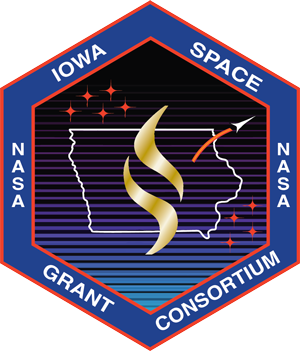Curriculum Development Program – Request for Proposals
Deadline: July 31, 2025 | Released: May 13, 2025
Overview
The Iowa Space Grant Consortium (ISGC) requests proposals for the Curriculum Development (CD) program which will support the development of Science, Technology, Engineering, and Mathematics (STEM) related curricula with a focus on improving student skills. The ISGC plans to award two projects with emerging curriculum aligning with any of the six NASA Mission Directorates (MD), Aeronautics Research (ARMD), Mission Support (MSD), Science (SMD), Exploration Systems Development (ESDMD), Space Operations (SOMD), and Space Technology (STMD).
To be considered for this funding, proposals should utilize STEM related curricula focused on preparing the future STEM workforce and/or STEM preservice educators by including (but not limited to) augmenting hands-on instruction, using online and virtual NASA content experiences, using publicly available NASA data, and accelerating the use of digital learning tools.
Priority will be given to proposals which:
- are developing curricula supporting interdisciplinary learning and are attempting to develop STEM ecosystems fostering partnerships between educators and industry;
- collaborate with other ISGC affiliates;
Projects will be selected through a competitive process using selection criteria put forth in this RFP. These criteria will: show alignment with MD priorities, demonstrate capacity of key personnel, indicate acceptable level of likelihood to succeed, be sustained in the future, and involve students in the development of the curriculum. The detailed ISGC Strategic Plan 2025-2028, NASA strategic plan and MD links can be found on ISGC web page at: https://www.iaspacegrant.org/resources/
Eligibility, Amount of Award, and Duration
All faculty of ISGC Core Institutions and Academic Affiliates are eligible to apply: Des Moines Area Community College (DMACC), Drake, Iowa, ISU, Loras College, Morningside University, and UNI.
Submission is limited to one proposal per investigator. Up to two awards will be funded at $20,000 each annually for 2-year period of performance beginning August 1, 2025, through June 21, 2027. A progress report will be required in February annually. A final report that includes an evaluation of the project’s effectiveness relative to the proposed objectives and other standard ISGC and NASA requirements will be required 30 days after the annual performance period closes or by July 20, 2026 & 2027. Future funding is contingent upon all reporting requirements being met annually. Awardees will be required to submit the progress and final reports through the ISGC portal for faculty reporting on our website. All awards are dependent upon NASA funding availability.
Proposal Content:
Project Description (five-page maximum, 12 pt. font) that should include:
- Background
- Goals and objectives of the project
- Support for mission directorate alignment
- Evaluation plan
- Timetable
- Long term benefits
- Key personnel
Budget and budget narrative (two-page maximum)
- Budget and justification that explains, in itemized detail, the ISGC amount requested and non-federal match contributions from the proposing institution (see g. below)
- Cost-share can be cash and/or in-kind contributions of faculty or staff release time
- Charging indirect on NASA funds is not allowable
- Waived indirect from NASA funds and cost share may be counted towards meeting the total match required of 1:1 per award (i.e., $20,000)
- Equipment purchases, facility construction or renovation, and foreign travel are not permitted (the definition of equipment is >$5,000 per item)
- The ISGC excel budget template is required, and is available online.
Matching fund commitment letter from an authorized institutional representative (typically an office of sponsored programs or grants office {except at ISU – use departmental approval process})
Course approval from head/chair of the department or dean of the college
Curriculum vitae of Principal Investigator (two–page maximum)
Allowable expenses
Funds may be used to purchase supplies, support faculty or staff release time, support undergraduate students, or domestic travel related to the course. Funds may not be used to support tuition. The proposal budget justification should describe how requested funds support the project goals. All supported individuals (faculty, staff, and students) must be U.S. citizens. Non-U.S. citizens may participate but cannot receive direct compensation from the award or cost-share funding. See budget template for unallowable expenses.
Criteria for Evaluation
A scientifically literate panel of individuals who may not necessarily be experts in the proposed area will review proposals. The ISGC interim director will make the final decision on proposal funding. The following areas will be considered in the evaluation of the proposal:
Criteria | Topics | % |
|---|---|---|
Total | 100% | |
Educational Merit | Scientific, technical, and educational merit of the proposed project.
The degree to which this proposal is relevant to the science, technology, engineering and mathematics (STEM) curriculum. | 30% |
NASA Relevance | The degree to which this proposal is relevant to NASA’s Mission Directorates. | 30% |
Management | Competency of the proposers to carry out the plan and achieve the stated goals. Potential of the project to increase undergraduate retention and achievement, particularly for women and underrepresented groups.
Includes students in course development. | 10% |
Evaluation | Plan for evaluation of the course developed or re-designed | 10% |
Budget | Adequacy and appropriateness of the budget to carry out the project, including institutional contributions or other matching funds. | 20% |
Proposal Submission Procedure
Submit proposals in Microsoft Word format to the ISGC office via this link: Curriculum Development Submission by July 31, 2025. The budget is to be submitted with the ISGC Excel template available for download at: https://www.iaspacegrant.org/faculty/ (Two sheets/tabs are provided: the budget template, and justification.)
- Number of students (including demographics) involved in hands-on research,
- Demonstrated scholarship as measured by peer-reviewed papers, presentations, other publications, talks, posters and/or patents/licenses produced
- NASA collaborations established or strengthened,
- Additional funding acquired
Questions
Questions may be sent to the ISGC administrative team:
- Director, Dr. Sara Nelson, sdnelson@iastate.edu
- Assistant Director, Matthew Nelson, mnelson@iastate.edu
- Program Specialist II, Hailey Waller, hewaller@iastate.edu
